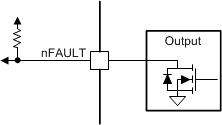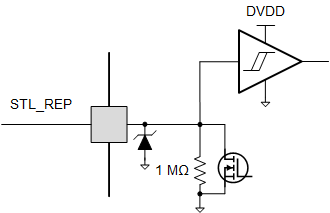SLOSEC6 August 2024 DRV8434A-Q1
PRODUCTION DATA
- 1
- 1 Features
- 2 Applications
- 3 Description
- 4 Pin Configuration and Functions
- 5 Specifications
-
6 Detailed Description
- 6.1 Overview
- 6.2 Functional Block Diagram
- 6.3
Feature Description
- 6.3.1 Stepper Motor Driver Current Ratings
- 6.3.2 PWM Motor Drivers
- 6.3.3 Microstepping Indexer
- 6.3.4 Controlling VREF with an MCU DAC
- 6.3.5 Current Regulation and Decay Mode
- 6.3.6 Charge Pump
- 6.3.7 Linear Voltage Regulators
- 6.3.8 Logic Level, Tri-Level and Quad-Level Pin Diagrams
- 6.3.9 Protection Circuits
- 6.4 Device Functional Modes
- 7 Application and Implementation
- 8 Power Supply Recommendations
- 9 Layout
- 10Device and Documentation Support
- 11Revision History
- 12Mechanical, Packaging, and Orderable Information
6.3.8.1 nFAULT and STL_REP Pin
The nFAULT pin has an open-drain output and should be pulled up to a 5 V, 3.3 V or 1.8 V supply. When a fault is detected, the nFAULT pin will be logic low. nFAULT pin will be high after power-up. For a 5 V pullup, the nFAULT pin can be tied to the DVDD pin with a resistor. For a 3.3 V or 1.8 V pullup, an external supply must be used.
 Figure 6-11 nFAULT Pin
Figure 6-11 nFAULT PinThe STL_REP pin has open-drain output and must be pulled up to a 5 V, 3.3 V or 1.8 V supply. When a stall fault is detected, the STL_REP pin will be logic high. After a successful stall threshold learning, STL_REP pin is pulled low. The STL_REP pin can also be used as an input. When pulled low externally, stall fault reporting is disabled. For a 5 V pullup, the STL_REP pin can be tied to the DVDD pin with a resistor. For a 3.3 V or 1.8 V pullup, an external supply must be used.
 Figure 6-12 STL_REP pin
Figure 6-12 STL_REP pin